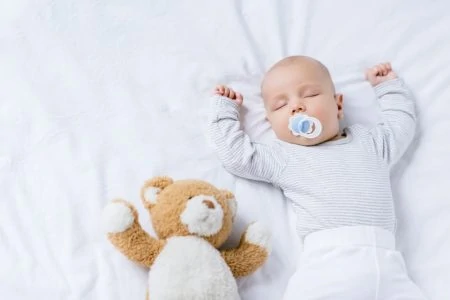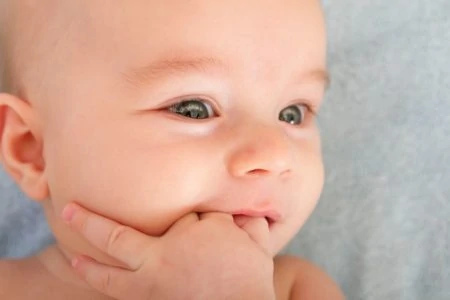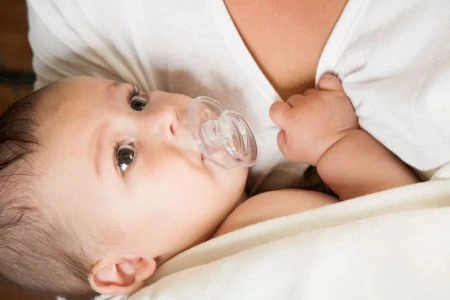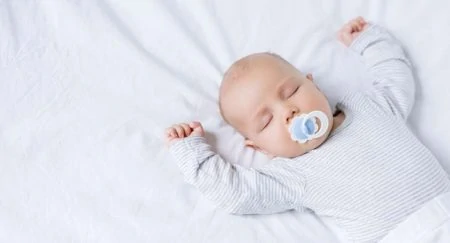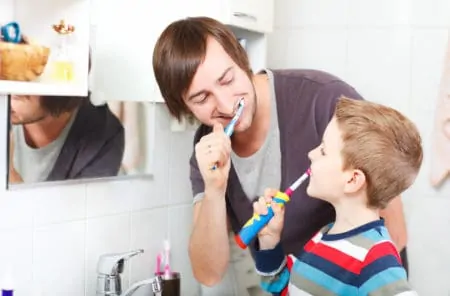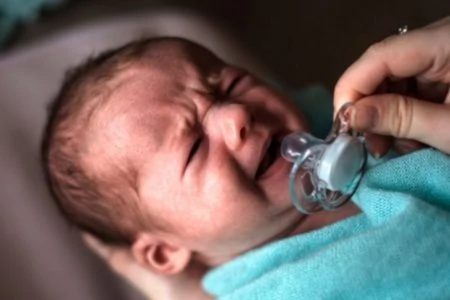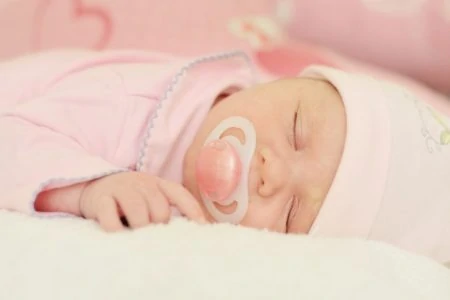Does your baby rely on their pacifier for comfort, leaving you worried about potential dental bills down the road?
Sucking on a pacifier or bottle is a natural, soothing instinct for infants, but prolonged use can unfortunately wreak havoc on that developing smile. Even though baby teeth are temporary, they act as critical placeholders for adult teeth and affect speech development.
We dug into the research on how pacifiers and bottles impact oral health to help you navigate these choppy waters. Here is everything you need to know about avoiding dental problems, plus practical tips for weaning your little one when the time is right.
Key Takeaways
- Prolonged pacifier use can lead to bite issues like crossbites, open bites, and jaw misalignment.
- To protect oral health, aim to start weaning from the pacifier between 6 and 12 months, or by age two at the latest.
- Baby bottle tooth decay occurs when sugary liquids (like juice or milk) sit on the teeth for too long, often during sleep.
- Transitioning from a bottle to a sippy cup or open cup by 12 to 14 months helps prevent long-term dental risks.
How Pacifiers Impact Dental Health
Pacifiers are a lifesaver for many parents. They satisfy a baby’s intense urge to suck and provide instant comfort during fussy moments. Research even shows they help reduce the risk of Sudden Infant Death Syndrome (SIDS) in babies between one and six months old (1).
However, relying on a binky for too long can change the shape of your child’s mouth. As the jaw grows, it forms around whatever is consistently inside it. According to the American Academy of Pediatrics (AAP) and the American Dental Association (ADA), overuse affects how the mouth and teeth develop (2)(3).
Potential issues include:
- Crooked teeth: Teeth may grow in at incorrect angles.
- Protruding front teeth: The top teeth may slant outward while bottom teeth tilt inward.
- Jaw misalignment: This often presents as an overbite or crossbite.
- Roof changes: The palate (roof of the mouth) can narrow and deepen.
Preventing “Pacifier Teeth”
You don’t have to ban the binky entirely. With proper use, your baby can self-soothe without permanent damage. The goal is to wean your child by age two, as many dental changes remain reversible up to that point.
Ideally, you should try to stop using the pacifier between 6 and 12 months. Breaking the habit becomes much harder once your toddler can walk, talk, and hunt for the pacifier themselves.
To lower the risks, look for pacifiers labeled “orthodontic,” which are designed to minimize gum pressure. You should also limit pacifier use strictly to nap time and bedtime once your baby passes the six-month mark.
Tips for Ditching the Binky
Is it time to say goodbye to the pacifier? Here are some proven strategies to make the breakup easier:
- Master distraction: When they ask for the paci, immediately pivot to a fun activity like reading a book, coloring, or playing with a favorite toy.
- Use a transitional object: Since the pacifier is an emotional crutch, replace it with a different comfort item, like a soft blanket or a stuffed animal.
- Praise the progress: verbalize how proud you are. Say things like, “You are such a big kid for leaving your binky in the crib!”
- Chart the success: Use positive reinforcement charts. A sticker for every nap without a pacifier can work wonders.
- Broaden your soothing toolkit: Comfort your child with rocking, singing, or back rubs so they learn other ways to calm down.
- Time it right: Avoid weaning during high-stress periods. Moving houses, a new sibling, or starting daycare are not great times to take away a comfort object.
- Stay positive: Avoid scolding or punishing your child for wanting the pacifier; it is a hard habit to break.
- The Pacifier Fairy: For older toddlers, a “farewell ceremony” works well. Have the “Pacifier Fairy” come take the binkies away and leave a cool toy in exchange.
How Bottles Affect Baby Teeth
Bottles are essential for formula feeding or feeding pumped milk. However, allowing a child to sip on a bottle throughout the day or night can lead to serious dental decay.
Bottles carry the same alignment risks as pacifiers regarding jaw shape. Furthermore, they pose a massive risk for “baby bottle tooth decay” if they contain anything other than water.
Understanding Baby Bottle Tooth Decay
Tooth decay in infants is often caused by frequent exposure to sugary liquids. This includes formula, milk, and fruit juice. The bacteria in the mouth feed on these sugars and produce acids that attack the teeth.
The most common cause is putting a baby to bed with a bottle. Because saliva flow decreases during sleep, the sugary liquid pools around the teeth for hours, causing rapid decay. This can lead to painful infections and, in severe cases, the need for extraction.
Early Warning Signs
If the decay progresses, you might notice these symptoms:
- Brown or black spots on the teeth.
- Bad breath that won’t go away.
- Red, swollen, or bleeding gums.
- Fever or irritability (signs of infection).
Simple Ways to Prevent Decay
The best cure is prevention. Follow these guidelines to keep those baby teeth sparkling:
- Wean on time: Aim to transition off the bottle by 12 months, and definitely by 18 months.
- Mealtime only: Once your child is eating solids, serve milk only with meals. Offer water in a cup throughout the rest of the day.
- No bottles in bed: Never put your baby to sleep with a bottle of milk or juice. If they need a bottle to sleep, fill it with plain water only.
- Skip the juice: The AAP recommends avoiding juice entirely for babies under one year. Even for toddlers, whole fruit is a better choice.
- Don’t use it as a pacifier: Avoid letting your child walk around with a bottle hanging from their mouth for comfort.
- Clean the gums: Before teeth erupt, wipe gums with a damp cloth. Once teeth appear, brush twice a day with a smear of fluoride toothpaste.
- Book the first visit: The ADA recommends the first dental visit by age one or when the first tooth appears (4).
Strategies for Bottle Weaning
Moving from bottle to cup is a major milestone. Here is how to handle the transition smoothly:
- Start early: Introduce a small open cup or straw cup around six months so it isn’t a foreign object later.
- The slow swap: Replace one bottle feeding per day with a cup. Stick with that for a few days, then swap out another. Usually, the bedtime bottle is the last to go.
- Watch the calendar: Try not to start weaning during other big life changes, like a new babysitter or a move.
- Dilute the bottle: If your toddler refuses to give it up, start watering down the milk in the bottle while offering full-strength milk in a cup.
- Offer alternative comfort: If the bottle is for soothing rather than hunger, offer a lovey or extra cuddles instead.
- Involve them: Let your toddler pick out their own “big kid” cup at the store to get them excited about the switch.
FAQs
Protecting Little Smiles
Bottles and pacifiers are wonderful tools for soothing and nourishing babies in those early months. They provide security and help everyone get a little more sleep.
However, moderation and timing are everything. By weaning from the bottle by 12-18 months and the pacifier by age two, you can avoid costly dental corrections later. Keep an eye on those tiny teeth, brush them daily, and don’t hesitate to ask your pediatric dentist for help if the habits are hard to break.
